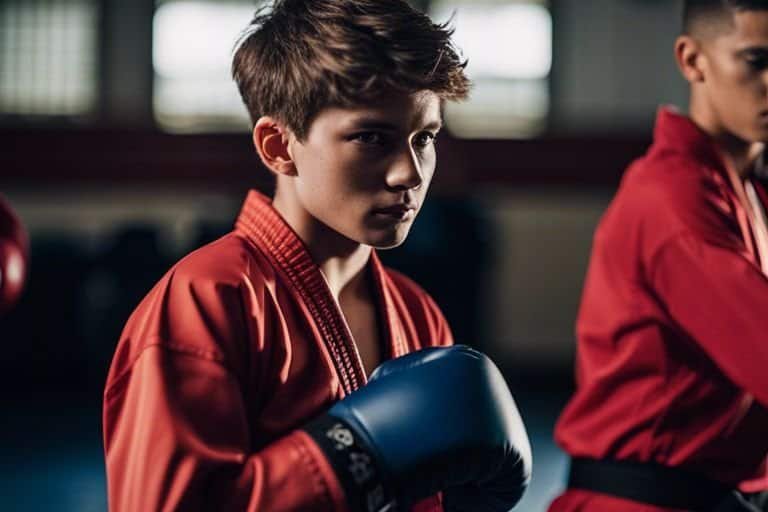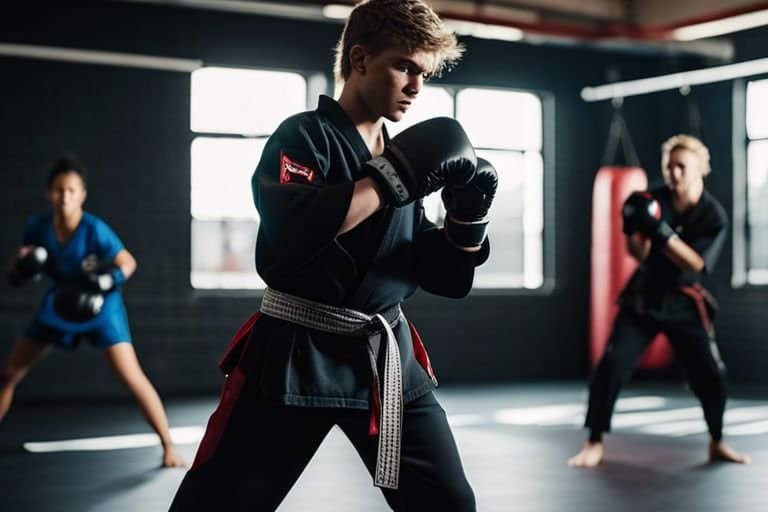Extracurricular activities are crucial for a teenager’s development, and for those seeking a well-rounded experience, MMA classes offer incredible benefits beyond physical fitness. While mastering various martial arts disciplines and improving overall strength and agility, teenagers also gain important self-defense skills, discipline, and respect for others. Additionally, the mental toughness and problem-solving skills learned through MMA training can help teenagers navigate the challenges they face in daily life, building their confidence and overall self-esteem.
Key Takeaways:
- Improved physical fitness: MMA classes provide a full-body workout that improves strength, agility, and stamina. This can lead to better overall physical health and reduced risk of obesity-related issues.
- Enhanced mental discipline: Enrolling in MMA classes can help teens develop mental discipline, focus, and self-control. These skills can be beneficial in various aspects of their lives, including academics and personal relationships.
- Self-defense skills: MMA classes teach practical self-defense techniques that can help teenagers feel safe and empowered in potentially dangerous situations. Learning these skills can boost their confidence and promote a sense of security.
Physical Benefits of MMA Training
Any parent considering enrolling their teenager in MMA classes will undoubtedly be interested in the physical benefits that come with this type of training. MMA, which stands for mixed martial arts, offers a wide range of physical advantages that go beyond just improved fitness.
Enhancing Strength and Cardiovascular Health
An integral part of MMA training is the focus on building strength and cardiovascular health. Through a combination of striking, grappling, and wrestling techniques, teenagers can develop lean muscle mass, improved core strength, and enhanced endurance. The high-intensity nature of MMA workouts also helps to elevate heart rate and improve overall cardiovascular health, making it an effective form of exercise for teenagers.
Improving Flexibility and Coordination
Flexibility and coordination are two key components of physical fitness that are improved through MMA training. The dynamic movements and techniques involved in MMA require participants to have a high level of flexibility and coordination. Over time, teenagers who engage in MMA classes will notice improvements in their range of motion, agility, and overall physical coordination.
Improving flexibility and coordination through MMA training can have lasting benefits for teenagers as they grow and develop. These skills are not only valuable for athletic performance but also for daily activities and injury prevention. By incorporating MMA into their routine, teenagers can enhance their overall physical capabilities and set a strong foundation for a healthy, active lifestyle.
Mental and Emotional Advantages
Assuming your teenager enrolls in MMA classes, they will experience a range of mental and emotional advantages that extend far beyond physical fitness. These classes can provide numerous benefits for your teen’s mental and emotional well-being, helping them to develop important life skills and cultivate a positive mindset.
Building Confidence and Self-Esteem
An essential aspect of MMA classes is the emphasis on personal growth and self-improvement. Through consistent training and facing challenges, teenagers can build confidence in their abilities, both inside and outside the gym. As they progress and achieve new skills, they will experience a boost in self-esteem and a belief in their own capabilities. This increased confidence can positively impact various areas of their life, from academic performance to social interactions, empowering them to tackle obstacles with a can-do attitude.
Furthermore, the supportive environment of MMA classes, where students encourage and cheer for each other’s progress, creates a positive emotional atmosphere that fosters self-belief and resilience. These experiences can help teenagers develop a strong sense of self-worth, preparing them to face the challenges of adolescence with confidence and resilience.
Developing Discipline and Focus
Emotional discipline and focus are essential attributes that teenagers can cultivate through participation in MMA classes. The structured training sessions and the focus required to learn and execute techniques help adolescents develop a sense of discipline that can be applied to all aspects of their lives. The mental concentration and focus required during sparring and drills can improve their ability to concentrate, aiding in academic endeavors and other extracurricular activities.
The sense of achievement that comes from mastering new skills and techniques in MMA classes can also instill an understanding of the importance of hard work and dedication in achieving their goals, teaching them valuable life lessons that will serve them well into adulthood.
Social and Life Skills Development
For teenagers, enrolling in MMA classes goes beyond physical fitness. The training they receive in mixed martial arts helps develop essential social and life skills that will benefit them in all areas of their lives.
Fostering Teamwork and Communication
On top of the physical aspects of MMA, such as striking and grappling techniques, teenagers learn the importance of teamwork and communication. Partner drills and sparring sessions require students to work together, communicate effectively, and support each other in their training. These skills are invaluable not only in the gym but also in school, work, and personal relationships. By learning to collaborate with others and express themselves clearly, teenagers gain valuable tools for success in all areas of life.
Learning Respect and Leadership
Fostering respect and leadership is another crucial aspect of MMA classes for teenagers. In the gym, students are taught to respect their instructors, peers, and the sport itself. They learn the importance of discipline, humility, and integrity, which are essential qualities for leadership. Additionally, as teenagers progress in their training, they have the opportunity to take on leadership roles, such as assisting in teaching lower-ranking students. This allows them to develop their leadership skills and gain confidence in guiding and supporting others.
Learning respect and leadership through MMA classes helps teenagers become well-rounded individuals with the ability to lead by example, demonstrate humility, and earn the respect of others. These qualities are not only beneficial in the gym but also in their academic and professional pursuits.

Practical Considerations for Parents
To ensure the best experience for your teenager in MMA classes, there are practical considerations that parents should take into account. These considerations include choosing the right MMA school and instructor, as well as implementing safety measures and injury prevention protocols.
Choosing the Right MMA School and Instructor
For parents considering enrolling their teenager in MMA classes, it is crucial to carefully select the right school and instructor. Look for a reputable MMA school that emphasizes safety protocols and proper techniques. Additionally, inquire about the background and experience of the instructor, making sure they have the necessary qualifications and certifications. It’s important to ensure that the instructor is focused on building confidence, self-discipline, and respect, in addition to teaching martial arts skills.
Safety Measures and Injury Prevention
Prevention of injuries is a top priority in any sport, and MMA is no exception. MMA schools should have strict safety measures in place, including adequate protective gear and supervised sparring sessions. The instructor should prioritize teaching proper techniques and emphasize the importance of respecting one’s training partners. Parents can also play a role in injury prevention by monitoring their teenager’s training schedule and ensuring they have adequate rest and recovery time.
This ensures that teenagers can fully benefit from their MMA classes while minimizing the risk of injury.

To wrap up
Taking this into account, enrolling your teenager in MMA classes offers a wide range of benefits beyond just physical fitness. It provides an opportunity for personal growth, discipline, self-confidence, and self-defense skills. The combination of physical and mental training helps teenagers build strong character and improve overall well-being. MMA classes can also serve as a positive outlet for stress and energy while teaching valuable life skills that can be carried over into adulthood. The benefits of MMA classes reach far beyond the physical, making it a valuable investment in your teenager’s development.
FAQ
Q: Why should I enroll my teenager in MMA classes?
A: Enrolling your teenager in MMA classes offers a wide range of benefits beyond just physical fitness. It helps in building confidence, self-discipline, and mental strength while teaching valuable self-defense skills.
Q: Is MMA suitable for teenagers, considering its physical intensity?
A: MMA classes are designed to cater to individuals of all ages and fitness levels, including teenagers. The training is structured to gradually build strength, endurance, and technique, ensuring safe progression for teenagers.
Q: How does MMA training help teenagers build self-discipline?
A: MMA training instills discipline through rigorous physical conditioning, adherence to rules and techniques, and the requirement for consistent practice and dedication, teaching teenagers the value of commitment and self-control.
Q: Will MMA classes teach my teenager self-defense skills?
A: Yes, MMA classes focus on practical self-defense techniques that can be used in real-life situations, empowering teenagers to protect themselves and build a sense of personal security.
Q: Can teenagers participate in MMA competitions, and is it safe?
A: Teenagers can participate in supervised and regulated MMA competitions that prioritize safety. Coaches and instructors ensure that teenagers are adequately prepared and equipped for competitive events, emphasizing skill development and sportsmanship.



